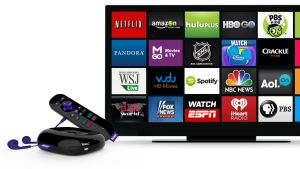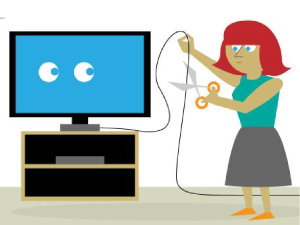A few weeks ago I remember getting into a debate with some friends about the future of cable television. My opinion was that cable would be around for a while in spite of cord cutters (those who choose to end their subscriptions to cable television) because popular television shows, even if they are available online, depend on television to be produced in the first place. For instance, the very popular show The Walking Dead, I said, would not exist on the internet if cable television went out of business. However, after doing some digging and getting to understand the issue a little deeper, I now believe that in many ways, I was wrong. The truth is that cable television’s days are numbered – at least for the cable television as we know it from the past. Indeed, the future of cable TV is going to depend on its ability to adapt to the changing tides. Currently, however, things don’t look to good. Following are the three most important F’s surrounding the issue of cord cutting.
Financial Implications
The stocks of many entertainment companies took a huge hit in 2015; 2016 is looking like it may be even worse. For instance, Time Warner sunk by over 20 percent; Disney saw its biggest drop in years (though it increased some recently due to Star Wars success), while Viacom tanked by over 40 percent. In contrast, Netflix’s stock more than doubled last year. Many people, especially millennials, feel that cable is just too expensive; and with a subscription to streaming services such as Hulu and Netflix costing less than $10 per month, it’s not hard to see why. One question I had in relation to all this was – well, what about the internet? Most telco companies like Verizon, AT&T, and Time Warner offer packages that include both internet and cable, with internet comprising a big portion of the costs. The answer is that people are becoming increasingly resourceful in finding free WiFi, especially in cities. Many cities offer completely free WiFi to some extent. Even if they don’t, every Starbucks offers free WiFi as do many other businesses. Facebook is even working on providing free WiFi to many people.
The next question I had is – what about shows that are not available for free streaming online? Again, many people, especially millennials have found ways to access this content online, in the form of piracy. Pirated content, though risky and completely unethical, has gotten easier. With special browsers and encryption available to make it more difficult to be tracked and with most people realizing that piracy is so rampant it would cost more for authorities to prosecute the small fish in the sea, people seem willing to take the risk. I remember reading an article recently about pirated Netflix and NBA League pass subscriptions. Apparently, thrifty hackers out there collect usernames and passwords and then sell the subscriptions to buyers for a one-time fee. The amazing thing is that many of these hackers offer a “lifetime guarantee” meaning that if the illegal account they sold you gets shut down they will just provide you with another account. In the eyes of those who buy these illegal subscriptions, it is the hackers taking most of the risk.
In any case, the bottom line is that cable has a lot of competition, both legal and illegal. Even just the legal aspect is cause for huge concern in the industry. Taking a closer look at Disney helps to illustrate this. At first glance, one would think that Disney’s position could not be better. They are one of the most loved brands in the world, they have the success of retail products, the Star Wars movie most recently, beloved toys and classic movies, the success of Disneyland and Disneyworld, and even a brand new Disneyland Shanghai opening this year. How could their stock be in trouble? The answer lies in the fact that over 50 percent of their operating income comes from “media networks” that include ESPN, ABC, and the Disney Chanel. ESPN alone is in real trouble and is the primary reason for Disney’s stock trouble, having lost over 7 million subscribers in two years. This shows very well how much companies that rely on cable have to worry about their bottom lines while the above paragraphs illustrate why consumers have huge financial reasons of their own to become cord cutters.
Another financial issue of concern is advertisements. In spite of losing subscribers, costs for advertising on cable networks is increasing. Much of this lies in the fact that television still accesses large audiences in the course of a single advertisement. This feat is currently not fully true for many other media outlets, including the internet. However, I believe advertising will find more and more ways to integrate into mobile, streaming, and web based services – even to the point where they no longer are willing to pay the cable fees.
Freedom Implications
Millennials enjoy their freedom in every sense of the word. We want our work-life balance. We want our shows when and where we want them. Currently, television programming does not allow this. Streaming services do. Finding media content online, whether it be TV shows, videos, or movies, gives us the control of deciding when, how, and where we want to watch everything. This combined with the financial benefits is difficult to resist. Add the reality that soon internet will likely to be more and more readily available for free in major urban areas and this means that unless something changes, many of us and even the generations before us will continue cord cutting in masses.
Future Implications
Cable companies need to find a way to adapt or they will fail. Projections are that people will continue to become “cord cutters” as more affordable options continue to become popular. Many of these options, such as Netflix, Hulu, Netflix, and Youtube, are changing the game even more by opening up their own studios and beginning to produce their own series. Furthermore, with technologies such as Roku and Amazon Fire available, this makes things very easy to do. Apple is even rumored to be releasing an Apple online streaming service sometime in the near future to go along with their Apple TV. With Apple’s reputation of shaking up things, I think it’s safe to say that when Apple’s streaming service hits the market there will be a flood of cable cancellations and a surge in Apple’s stock price once again.
Cable companies really only have a few options. They need to make cable cheaper. They need to find a way to provide their own streaming services. They need to talk to the networks and come up with new ways to get online. They need to make up in volume what they are losing in margin. They need to make shows available for viewing based on the customer’s convenience of whenever they want. They need to make new deals with the networks so that that customers can get personalized sets of channels rather than paying for a ton of channels they will never watch.
What do you think about cord cutting? Do the cable companies have a chance? Where do you see the future of media in a decade?
References
http://www.businessinsider.com/cord-cutters-and-the-death-of-tv-2013-11
http://www.huffingtonpost.com/david-mager/the-end-of-broadcast-tv_b_4247351.html
http://content.time.com/time/magazine/article/0,9171,2149608-2,00.html
http://www.cnbc.com/2015/12/30/can-cable-compete-with-streaming-tv-in-2016.html
http://www.billboard.com/articles/business/6828171/entertainment-stocks-report-2015



6 Responses to The 3 F’s of Cord Cutting